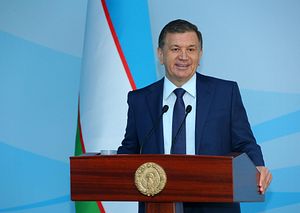A phrase repeated ad nauseum by regional observers when speaking about Uzbekistan these days is “cautious optimism.” In the nine months since the death of Islam Karimov, new Uzbek President Shavkat Mirziyoyev, earnestly playing the part of a good neighbor, has made serious efforts to patch up Uzbekistan’s relations within the region. The examples are myriad: progress on border talks with Tajikistan, Kazakhstan, and Kyrgyzstan; financing the construction of a school in Osh, Kyrgyzstan and donating $30,000 in costumes and scenery to an Uzbek theater in the city; visits by the president to Turkmenistan and Kazakhstan (twice), not to mention visits by the other high ranking government officials to Tajikistan and high-level diplomatic meetings with Kyrgyz officials.
Now, it seems that the Uzbek government is turning due attention toward the country’s international relations, particularly with international organizations and multilateral initiatives.
On May 10, OSCE Parliamentary Assembly President Christine Muttonen left Uzbekistan after a three-day visit — the first by an OSCE PA president in more than a decade. In February, an Uzbek delegation participated in an OSCE PA meeting for the first time since 2002. According to the OSCE, Muttonen met with Uzbek Prime Minister Abdulla Aripov and Foreign Minister Abdulaziz Kamilov, among others.
“I have followed with great interest the developments in Uzbekistan and my visit represents another step to consolidate our cooperation,” said Muttonen.
As Muttonen left, the UN High Commissioner for Human Rights Zeid Ra’ad Al Hussein and his delegation arrived. Hussein’s visit will be closely watched by human rights activists, who have long criticized Uzbekistan for a range of issues from torture and political imprisonment to use of forced labor.
In February, Uzbekistan released Muhammad Bekjanov, a journalist who had been imprisoned for 18 years. While human rights advocates cheered the release, most espoused a version of “cautious optimism,” pointing out that the move should be followed not just by other releases but a change in how Tashkent views human rights, free press, and dissent more generally.
There have been other promising improvements which could feed reform; for example, the introduction of a 24-hour news channel this month by presidential decree. As EurasiaNet reported, Mirzyoyev — in a government meeting that was televised — complained that “the time for hooray patriotism has passed and we should have critical and analytical content on our televisions, so that viewers might instead await TV shows with impatience.” Once taboo topics — like the country’s cash shortage — have reportedly cropped up in nightly news broadcasts.
Uzbekistan’s deplorable human rights record, juxtaposed with the recent opening chords of change, make Hussein’s visit one to watch. According to Trend, this is Hussein’s first visit to Central Asia since he took up his position in September 2014.
Suma Chakrabarti, president of the European Bank for Reconstruction and Development (EBRD), made her own three-day visit to Uzbekistan in March, signaling serious reengagement between Tashkent and the bank. Relations between the country and the bank began to sour in 2003 and there have been “no fresh operations” since 2010. According to the EBRD, Uzbek officials are expected to be in attendance at the Annual EBRD Meeting and Business Forum in Cyprus this week, the first time in nearly a decade.
Later this week, Mirziyoyev will travel to Beijing for the Belt and Road Forum — his first visit outside the immediate region (excluding his state visit to Russia in April, of course).
The opening continues. While many will remain cautious in their optimism, optimism is not something many regional observers would have used in the same sentence as Uzbekistan a year ago.

































